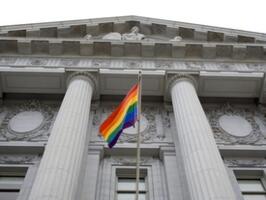Do You Want A Religious Freedom Law In Your State?
Most voters still oppose a religious freedom law in their state like the one adopted in Indiana. Yet despite concerns that such laws may lead to discrimination against gays and lesbians, voters also continue to strongly defend the right of a Christian photographer to turn down a same-sex wedding. Many also believe the media portray religious freedom laws unfairly.
Arkansas this week came a step closer to joining the 20 states that have laws prohibiting the government from forcing businesses to provide services they find objectionable on religious grounds, but 53% of Likely U.S. Voters oppose such a law in their state. The latest Rasmussen Reports national telephone survey finds that 35% favor a law that would allow businesses to refuse service to customers for religious reasons. Twelve percent (12%) are undecided. (To see survey question wording, click here.)
These findings show higher support for such laws compared to a survey of all adults last year just after Arizona Governor Jan Brewer vetoed similar legislation in her state. Just 20% of adults supported such a law in their state at that time, while 66% were opposed.
Fifty-three percent (53%) of voters are concerned that religious freedom laws will lead to widespread discrimination against gays and lesbians, including 30% who are Very Concerned. Forty-three percent (43%) don’t share this concern, with 22% who are Not At All Concerned.
Seventy percent (70%) still agree that a Christian wedding photographer who has deeply held religious beliefs opposing same-sex marriage has the right to turn down working a job at such a wedding. That’s down slightly from 73% last year and 85% in 2013 after a New Mexico photographer was sued for this reason. Nineteen percent (19%) believe the Christian photographer should not have the right to turn down a same-sex wedding job, while 12% are not sure.
Just 27% of voters believe gay rights groups and the media accurately portray religious freedom laws like the one in Indiana. Fifty-one percent (51%) disagree and think they make the laws sound more discriminatory than they really are. A sizable 22% are undecided.
(Want a free daily e-mail update? If it's in the news, it's in our polls). Rasmussen Reports updates are also available on Twitter or Facebook.
The national telephone survey of 1,000 Likely Voters was conducted by Rasmussen Reports on March 30-31, 2015. The margin of sampling error for the survey is +/- 3 percentage points with a 95% level of confidence. Fieldwork for all Rasmussen Reports surveys is conducted by Pulse Opinion Research, LLC. See methodology.
Half of voters agree with the U.S. Supreme Court that a business owner should be able to opt out of Obamacare’s contraceptive mandate if it violates his or her religious beliefs.
Seventy-six percent (76%) of voters say they have closely followed recent news reports about religious freedom laws like the one recently adopted in Indiana, including 33% who are following Very Closely. Those who say they are following the news the closest show slightly more support for similar laws in their state but also have the strongest concern that such laws discriminate against gays and lesbians.
Voters under 40 have much greater concern that religious freedom laws may discriminate and are less supportive of such laws. Most voters of all ages, though, are in general agreement that a Christian photographer should be able to turn down a same-sex wedding job.
Those 40 and over are more convinced that gay rights groups and the media mischaracterize religious freedom laws, but they are also following the news more closely than younger voters are.
Most Republicans (59%) favor religious freedom laws in their state, compared to just 13% of Democrats and 37% of voters not affiliated with either major political party.
Democrats are strongly concerned that such laws may discriminate against gays and lesbians; most GOP voters disagree. Unaffiliated voters are almost evenly divided. But 56% of Democrats agree with 84% of Republicans and 69% of unaffiliated voters that a Christian photographer should be able to turn down a same-sex wedding job if it violates his religious beliefs.
Most Republicans (74%) and unaffiliateds (53%) believe religious freedom laws are misrepresented by the media and gay rights groups, but just 30% of Democrats share that view.
Seventy-two percent (72%) of all Americans say their religious faith is important in their daily lives. Thirty-three percent (33%) think the government discriminates against people of religious faith, but 44% disagree.
Voters remain closely divided on the issue of gay marriage.
Forty-four percent (44%) of Americans think the media in this country are generally respectful of organized religion and those who practice it, but 36% say the media is not respectful of religion and people of faith.
Most voters nationwide support a law prohibiting workplace discrimination on the basis of gender identity or sexual orientation, but one-in-three think certain religious organizations should be exempt from it.
Additional information from this survey and a full demographic breakdown are available to Platinum Members only.
Please sign up for the Rasmussen Reports daily e-mail update (it’s free) or follow us on Twitter or Facebook. Let us keep you up to date with the latest public opinion news.
The national telephone survey of 1,000 Likely Voters was conducted by Rasmussen Reports on March 30-31, 2015. The margin of sampling error for the survey is +/- 3 percentage points with a 95% level of confidence. Fieldwork for all Rasmussen Reports surveys is conducted by Pulse Opinion Research, LLC. See methodology.
Rasmussen Reports is a media company specializing in the collection, publication and distribution of public opinion information.
We conduct public opinion polls on a variety of topics to inform our audience on events in the news and other topics of interest. To ensure editorial control and independence, we pay for the polls ourselves and generate revenue through the sale of subscriptions, sponsorships, and advertising. Nightly polling on politics, business and lifestyle topics provides the content to update the Rasmussen Reports web site many times each day. If it's in the news, it's in our polls. Additionally, the data drives a daily update newsletter and various media outlets across the country.
Some information, including the Rasmussen Reports daily Presidential Tracking Poll and commentaries are available for free to the general public. Subscriptions are available for $4.95 a month or 34.95 a year that provide subscribers with exclusive access to more than 20 stories per week on upcoming elections, consumer confidence, and issues that affect us all. For those who are really into the numbers, Platinum Members can review demographic crosstabs and a full history of our data.
To learn more about our methodology, click here.





